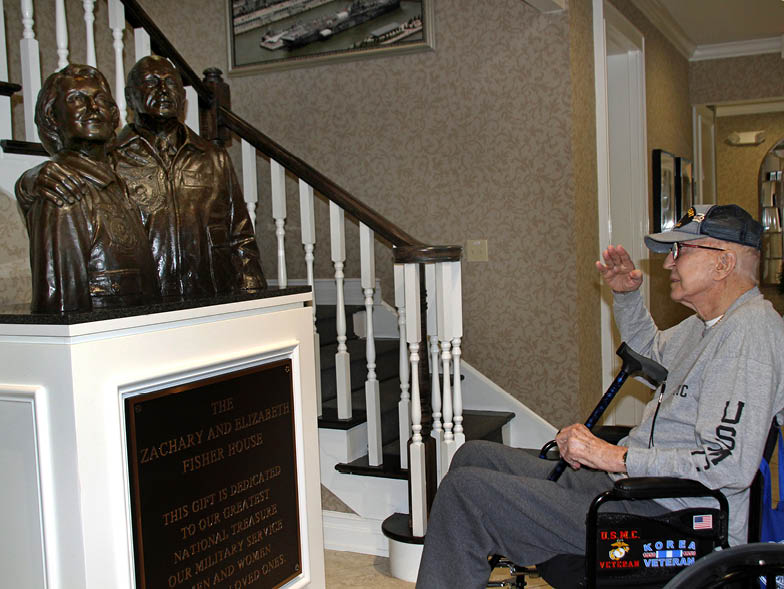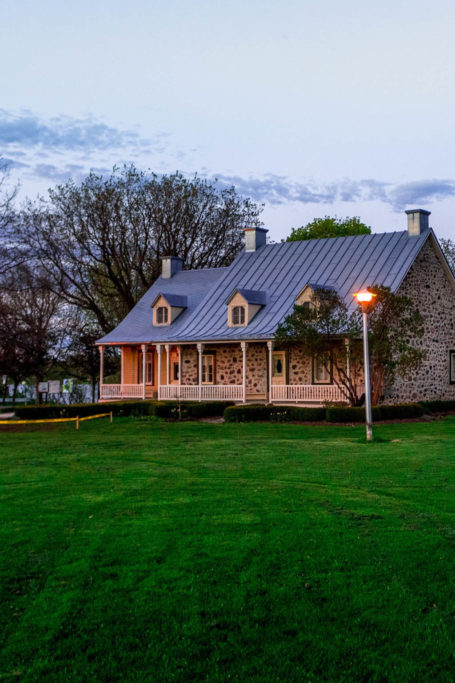A Patriot’s Promise: Fisher House Foundation
In 1991, president George H.W. Bush and his wife, Barbara, helped to dedicate a newly built temporary lodging facility for military families in Bethesda, Maryland. Presidents dedicate buildings all the time, but this occasion was even more exceptional.
Thanks to the vision and assistance of Zachary and Elizabeth Fisher, longtime philanthropic benefactors of the United States military, the first Fisher House opened on that day—and Fisher Houses have since changed the lives of millions.

“My uncle Zachary didn’t serve in the military but instilled patriotism in all of us,” says Ken Fisher, current chairman and CEO of Fisher House Foundation. “He told people he wanted to do something more for the military—for families—and when the need was brought to his attention, he said, ‘I have a developer and I have an architect. This is what I can do.’”
Zachary made his living in the New York real estate industry, and he spent the majority of his adult life fighting for and giving back to various veterans’ organizations. In 1978, Zachary helped save the aircraft carrier USS Intrepid from being scrapped and turned the legendary ship into the Intrepid Sea, Air & Space Museum, which is now the largest naval museum of its kind in the world.
Zachary Fisher’s dedication to veterans and their families was unwavering, and when the need for comfort housing for veteran families was brought to his attention, he didn’t stop until something was done.
The Blueprint
To combat the often difficult bureaucratic process, Zachary organized a system that combines the best efforts of both the private and public sectors. Fisher House works with the Department of Defense and VA to find out where the greatest need is and utilizes funds raised within the organization to construct new housing. Once a Fisher House is built, it is gifted to the military and VA to be owned and operated by the government.
It’s a partnership that has worked many times, with over seventy-five houses built nationally, two built internationally, and plans for more. Ken points out that the unique private-public ownership ensures that the areas with the most need are the ones being served and that new Fisher Houses are only built where demand is high.

Staffing for each house is the responsibility of the DoD and VA. Funds are raised to build new houses through a combination of community efforts and donations to the Fisher House Foundation, and once enough money is raised, the organization works with a number of trusted contractors across the country to begin the groundbreaking process.
Fisher Houses are built to match the architecture and design style of the surrounding area and can accommodate between sixteen and forty-two people, depending on the square footage.
Almost all of the homes are accessible for people with disabilities. “We don’t skimp on these houses,” says Ken, “in the sense that we build at the best quality for the men and women who will be staying there because we owe them so much. We feel as though that is our obligation, and we want to live up to that.”
So Much More Than Four Walls
The only requirement for a family to stay at a Fisher House is that it has a loved one undergoing treatment at a military or VA hospital that is at least 50 miles from their home; the foundation currently has enough housing to accommodate nearly 1,000 people per day.

But perhaps more important than the bed to sleep in is the camaraderie built within the walls of a Fisher House, between families who are all experiencing similar circumstances and work together to support one another. “When a family comes to stay at a house, they come in stressed,” Ken says. “Life doesn’t stop when a loved one is in the hospital, and so many times these family members have to be the primary health care advocates. They have to be there.”
Though a Fisher House is not a counseling center or group therapy, it can be a healing experience for a family going through the unimaginable. With a common kitchen, dining area, and laundry facilities in each house, Ken says that families often cook together, eat together, and do chores together, which makes for a wonderful bonding opportunity—and the chance to help care for one another when necessary.
“The meals are really a central point of the Fisher House experience,” notes Ken. “But when I say that the families support each other, I can’t stress how important that is. Tammy Duckworth, a senator from Illinois, once stayed at a Fisher House with her family and told me about a time when they returned to the house one night to find their dinner had been wrapped up and put away for them because they had to leave abruptly. That’s how phenomenal these families are.”
Families are encouraged to stay at a Fisher House as long as their loved ones are receiving treatment and can return to stay as many times as they need. With the families living in close proximity to the hospital and having freedom from financial burden, Ken says that a Fisher House affords people the freedom to be the best caretakers they can be.

Miles of Hope
In addition to providing housing, the Fisher House Foundation has expanded to offer other programs that have benefited thousands of military families. The foundation’s Hero Miles program collects unused airline miles so that military families can be near their loved ones undergoing treatment, while the Hotel for Heroes program collects unused rewards points to provide a place to stay near their injured loved ones when a Fisher House is not close by.
In addition, more than $18 million in scholarship funds has been given through the Scholarships for Military Children, Scholarships for Military Spouses, and Heroes’ Legacy Scholarships—the last of which Ken says the foundation is particularly proud of. In 2010, President Obama even donated the proceeds from his children’s book, Of Thee I Sing, to the scholarship fund, which benefits the children of fallen or disabled soldiers.
Though the organization has always been dedicated to military members, veterans, and their families, Ken says he hopes that it has done its part to make all Americans aware of their plight and sacrifice. “It’s no secret that there was a lot of bitterness toward service members after Vietnam,” he admits. “What my uncle sought to do was make sure that this would never happen to another generation of veterans. Saying ‘Thank you for your service’ is not enough anymore. We owe them a debt that we can never repay, and we feel it’s up to us to make this message heard.”
For more info, fisherhouse.org.























